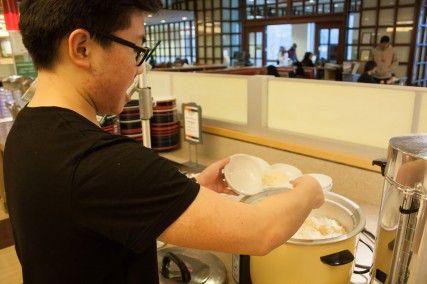
In an effort to reach out to the expanding Chinese student population, Boston University Dining Services will increase the culinary offerings of Chinese food, officials said.
Fifteen new authentically prepared Chinese meals will be added to all BU dining halls’ monthly meal rotation, said Executive Director for Auxiliary Services, Marc Robillard.
“Chinese students like the dining halls at first, but then they wished that they had options that were more like what they are accustomed to living in China,” Robillard said. “We felt it was important, since we can have control of the menu, to introduce new menu items that are more authentically prepared and more, from a taste perspective, in line with what students from China were expecting.”
The measure comes after a spike in Chinese student admissions rendered them the largest ethnic population at BU, prompting officials to consider their interests in particular.
“For the last couple of years, the number of Chinese students enrolled at BU has dramatically increased,” Robillard said. “As we are seeing more and more Chinese students, we wanted to do more things in both housing and in dining to be accommodating to those students and to increase their satisfaction with living on campus.”
Robillard said although this initiative is intended to appeal specifically to Chinese students, the movement is in line with BU Dining Services’ mission to adapt the menu to the needs of all students.
“It is nothing different than what we do for any other groups of students,” he said. “We have vegetarian options, we have vegan options; we have, at Marciano Commons, a gluten free station and halal food … we have vegan and we have vegetarian. We are trying to cover all of the big needs that are out there.”
The motivation for developing more Chinese dishes also stems from the significantly low return rate of on-campus housing among Chinese students, Robillard said.
“The [Chinese student] return rate from freshman to sophomore years on campus is not as high as domestic students and not as high as other international populations,” Robillard said. “We would like to see the Chinese students’ return rate the same as our domestic students.”
Robillard said he hopes the new meals will at the very least improve the Chinese student experience, if it does not encourage them to return to on-campus housing.
“All of the students are serious, but we are finding the Chinese students are very serious,” he said. “They seem to persist in staying in school, and their return rates are good. We just want to make sure that their experience is positive all the way around.”
Tam Ning Lam, a College of Arts and Sciences freshman from Hong Kong, said she does not think the new dishes will taste better than the current ones.
“Because they are so many Chinese [students] here, it is not surprising,” Lam said. “I do not think it is really effective because I do not think the dinning [hall] will have the best Chinese food.”
Lisa Wang, a CAS freshman from Ghangzhou, China, said the new Chinese dishes being added to the rotation will not affect her because she will not be living on-campus.
“I am living off-campus next year,” Wang said. “For me the reason is the price. I feel like living off-campus can make me have a better quality of life. I can cook my own food.”




















































































































Tom Wilkenson • Feb 6, 2014 at 5:41 pm
Love this idea, but would love to hear how dining came about with these new dishes? Did they do any market research as to what dishes may go over well? Did they talk to any students about what dishes they would like to see? Did they consult any Chinese chefs about the proper cooking methods?
It’s great you’re taking steps, but hopefully you didn’t’ just google “how to cook chinese food” and then create these dishes.